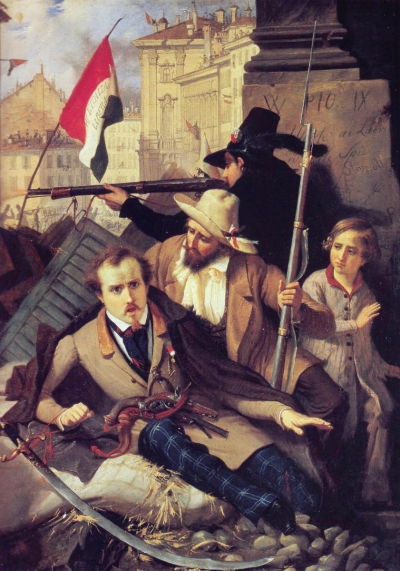Victor Emmanuel II (Italian: Vittorio Emanuele II; full name: Vittorio Emanuele Maria Alberto Eugenio Ferdinando Tommaso di Savoia; 14 March 1820 9 January 1878) was King of Sardinia from 1849 until 17 March 1861, when he assumed the title of King of Italy and became the first king of an independent, united Italy since the 6th century, a title he held until his death in 1878. Borrowing from the old Latin title Pater Patriae of the Roman emperors, the Italians gave him the epithet of Father of the Fatherland (Italian: Padre della Patria).
Born in Turin as the eldest son of Charles Albert, Prince of Carignano, and Maria Theresa of Austria, he fought in the First Italian War of Independence (18481849) before being made King of Piedmont-Sardinia following his father's abdication. He appointed Camillo Benso, Count of Cavour, as his Prime Minister, and he consolidated his position by suppressing the republican left. In 1855, he sent an expeditionary corps to side with French and British forces during the Crimean War; the deployment of Italian troops to the Crimea, and the gallantry shown by them in the Battle of the Chernaya (16 August 1855) and in the siege of Sevastopol led the Kingdom of Sardinia to be among the participants at the peace conference at the end of the war, where it could address the issue of the Italian unification to other European powers. This allowed Victor Emmanuel to ally himself with Napoleon III, Emperor of France. France had supported Sardinia in the Second Italian War of Independence, resulting in liberating Lombardy from Austrian rule.
Victor Emmanuel supported the Expedition of the Thousand (18601861) led by Giuseppe Garibaldi, which resulted in the rapid fall of the Kingdom of the Two Sicilies in southern Italy. However, Victor Emmanuel halted Garibaldi when he appeared ready to attack Rome, still under the Papal States, as it was under French protection. In 1860, Tuscany, Modena, Parma and Romagna decided to side with Sardinia-Piedmont, and Victor Emmanuel then marched victoriously in the Marche and Umbria after the victorious Battle of Castelfidardo over the Papal forces. This led to his excommunication from the Catholic Church until 1878, just before his death in the same year. He subsequently met Garibaldi at Teano, receiving from him the control of southern Italy and becoming the first King of Italy on 17 March 1861.
In 1866, the Third Italian War of Independence allowed Italy to annex Veneto. In 1870, Victor Emmanuel also took advantage of the Prussian victory over France in the Franco-Prussian War to conquer the Papal States after the French withdrew. He entered Rome on 20 September 1870 and set up the new capital there on 2 July 1871. He died in Rome in 1878, and was buried in the Pantheon.
The Italian national Victor Emmanuel II monument in Rome, containing the Altare della Patria, was built in his honor.
The unification of Italy (Italian: Unità d'Italia [uniˈta ddiˈtaːlja]), also known as the Risorgimento (, Italian: [risordʒiˈmento]; meaning "Resurgence") or as the Italian unification, was the 19th-century political and social movement that resulted in the consolidation of different states of the Italian Peninsula into a single state, the Kingdom of Italy. Inspired by the rebellions in the 1820s and 1830s against the outcome of the Congress of Vienna, the unification process was precipitated by the Revolutions of 1848, and reached completion in 1871 after the Capture of Rome and its designation as the capital of the Kingdom of Italy.Some of the states that had been targeted for unification (terre irredente) did not join the Kingdom of Italy until 1918, after Italy defeated Austria-Hungary in World War I. For this reason, historians sometimes describe the unification period as continuing past 1871, to include activities during the late 19th century and the First World War (1915–1918), and reaching completion only with the Armistice of Villa Giusti on 4 November 1918. This more expansive definition of the unification period is the one presented at the Central Museum of the Risorgimento at the Vittoriano.

1861Feb, 18
With Italian unification almost complete, Victor Emmanuel II of Piedmont, Savoy and Sardinia assumes the title of King of Italy.
Choose Another Date
Events on 1861
- 19Jan
Georgia (U.S. state)
American Civil War: Georgia joins South Carolina, Florida, Mississippi, and Alabama in declaring secession from the United States. - 21Jan
Jefferson Davis
American Civil War: Jefferson Davis resigns from the United States Senate. - 20Apr
Robert E. Lee
American Civil War: Robert E. Lee resigns his commission in the United States Army in order to command the forces of the state of Virginia. - 8May
Richmond, Virginia
American Civil War: Richmond, Virginia is named the capital of the Confederate States of America. - 6Sep
Ulysses S. Grant
American Civil War: Forces under Union General Ulysses S. Grant bloodlessly capture Paducah, Kentucky, giving the Union control of the Tennessee River's mouth.

 English
English  español
español  français
français  português
português  русский
русский  العربية
العربية  简体中文
简体中文 